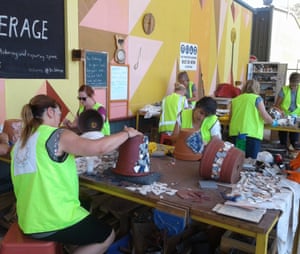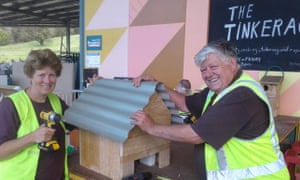Across Australia, repair cafes and tinkering spaces are equipping communities with power tools to fix and upcycle broken goods
The
dictionary defines tinkering as “to attempt to repair or improve
something in a casual or desultory way”. But there is nothing desultory
about the members of The Tinkerage, a community venture in Shellharbour
on the New South Wales
south coast. Every Friday, the place – a no-frills industrial space,
adjoining the local recycling facility – hums with quiet but deliberate
purpose.
At one workbench Pam is making a table out of a piece of recycled timber and applying a coat of shellac to its surface. At another, Pat is using a nib burner to complete a pokerwork sign spelling out the name of her neighbour’s property on weathered palings, before drilling them together as a gift. Tanya is finishing her first attempt at mosaic and thinking about a plant stand as her next project. Sharyn is assembling broken tiles from a box of donated materials to create decorative edging for her garden beds. Terry is making a gumboot stand for her grandchildren out of discarded and varnished chair legs.
These tinkerers are part of a global movement. From Amsterdam to
Perth, people are visiting repair cafes, maker-spaces and workshops to
discover how they can repair and reuse – rather than repeating a cycle
of buying, breaking and re-buying.At one workbench Pam is making a table out of a piece of recycled timber and applying a coat of shellac to its surface. At another, Pat is using a nib burner to complete a pokerwork sign spelling out the name of her neighbour’s property on weathered palings, before drilling them together as a gift. Tanya is finishing her first attempt at mosaic and thinking about a plant stand as her next project. Sharyn is assembling broken tiles from a box of donated materials to create decorative edging for her garden beds. Terry is making a gumboot stand for her grandchildren out of discarded and varnished chair legs.
In Shellharbour, many of the tinkerers met at the local bromeliad and succulent society, where they encouraged each other to have a go at this new initiative. Learning how to use power tools was the big attraction. “Our husbands are not very handy,” says one. Several heads nod. “Some of us were already pretty crafty, doing things like decoupage or rag rugs, but we’d never attempted furniture or upholstery before,” says another.
"The beauty of it is, you are not trying to make anything perfect"
Tinkerage members source most of their materials from the adjoining Revolve Shop, a spotless and immaculately organised recycling facility, where you can pick up furniture, doors, china, glass and countless preloved and discarded objects for next to nothing. Some are chipped or damaged, others are simply waiting for a second chance. Rusted birdcages become plant holders. A dog kennel gets a door and becomes a storage unit for garden tools. A set of tea strainers and spoons gets added to cut metal piping and voila – a wind chime. Ideas and inspiration often come from Pinterest and Instagram. “The beauty of it is, you are not trying to make anything perfect,” says one tinkerer. “The satisfaction comes from upcycling.”
Prominent signage reminds members to wear covered shoes and high-vis vests. The Tinkerage’s founder and director Anita Larkin moves quietly from bench to bench, offering technical guidance and assistance when needed. A local artist who works with found objects, she has a keen eye for the potential of every item, no matter how humble or broken it may be.
Larkin proposed The Tinkerage to the local branch of Resource Recovery Australia who embraced it enthusiastically, as did Shellharbour council. “It took two months to get us up and running, starting with two workbenches and some salvaged tools. Everyone gets a safety induction when they join. The number of people who’ve come through since we started is around 1,000, but workshops are limited to 10. It’s been slow to get going as no one knew we were here until word of mouth spread. Now we have more than 500 followers on Instagram.”
If The Tinkerage sounds like a female version of a men’s shed, it is and it isn’t. It’s true that on the day Guardian Australia visits, there are no men present, but a few are members, though they visit less often, perhaps because they do not belong to an existing network of gardeners or crafters. Their projects tend to be more functional and less decorative, involving fixing mowers, bicycles, wheelbarrows and chairs in need of new legs.
“Men’s sheds can be a bit hierarchical and often assume prior knowledge. I try to teach without condescending. Maybe there are more women here because of me. I’m not sure how many men want to ask a woman for assistance,” she says wryly.

“I show people how to repair anything they bring, from a tear in a shirt to lengthening a dress or making new handles for a fabric bag that someone loves and is not ready to let go of. The hard core are middle-aged women but we are getting younger people with limited resources focused on sustainability who want to escape fast fashion.”
The circular economy has taken a firm hold in the Illawarra. Perhaps because the region has a long history as a hub of working-class industry built on the dominance of coal and steel. It has a hardscrabble respect for honest materials and functional aesthetics. As local industries shut down, a new wave of frugality has created a recycling renaissance.
Eliot says: “There’s a culture evolving around places like The Tinkerage and the Library of Things [a new initiative offering shared access to tools and equipment in Bulli] and Wild Rumpus [a community-run organisation that promotes what it describes as purposeful play through classes in Thirroul] that is fostering different values focused on avoiding wastage and promoting community and skill sharing.”
"I see coming here as a baby step towards real societal change"
Guido Verbist is the director of Australia’s first repair cafe, The Bower in Marrickville in Sydney’s inner west. The concept became so popular it now has branches in Parramatta, Redfern and Zetland. A registered charity, The Bower has won awards for its holistic integration of recycling and repair programs which cover electricals, except white goods, computer and phones. As well as workshops, it provides a repair service for those who don’t feel up to learning how to fix things but don’t want to throw them away. It also distributes secondhand household goods to refugees and survivors of domestic violence and builds tiny house for the homeless from recycled timber.
For Verbist, membership of The Bower is a step on the path to recycling activism. “I see coming here as a baby step towards real societal change. We are currently campaigning for the right to repair. Many brands don’t allow you to mend their goods without forfeiting the warranty, but now legislation is being passed challenging that. In Sweden there are tax breaks for people who repair their own goods. Of course the big corporations hate it. Apple is fighting right to repair legislation in 20 states [in the United States].”
Confirming Verbist’s sentiments, the EU recently approved legislation requiring manufacturers to supply spare parts for 10 years to consumers. It’s a significant step forward for the recycling movement and for campaigners such as Kyle Wiens, founder of iFixit, the company in California that provides repair manuals and online tutorials for electronic devices.
Larkin has her own big dreams for The Tinkerage: “At the moment council is only allowing students over 16 to attend. I would like to extend the program to younger school children to give them know-how in problem solving and improve their manual dexterity. Tinkering teaches you how to improvise, which is a valuable life skill in building resilience.”
In the mean time, she and the tinkerers are soldering on.

No comments:
Post a Comment